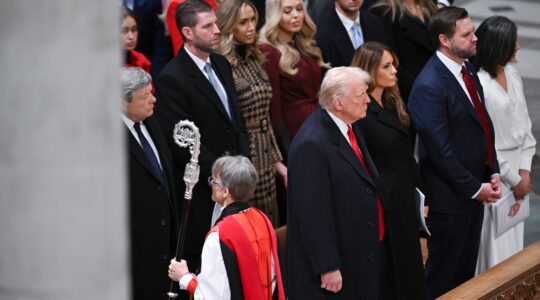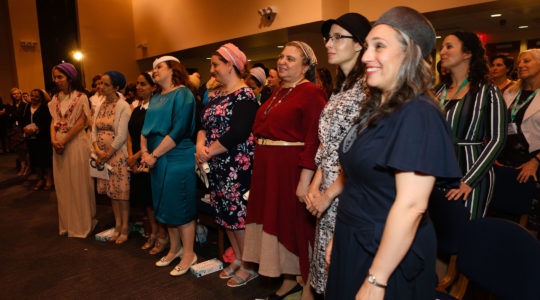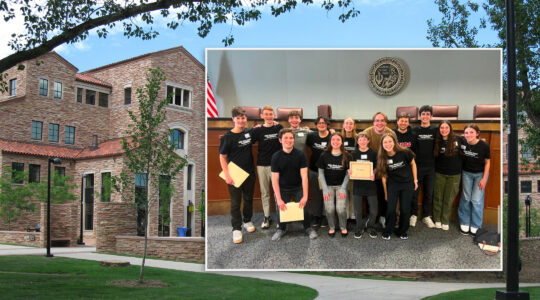What does it mean to be a leader? What does it mean to be an advocate? More than 250 people gathered in Washington, DC on February 4, 2020 for Jewish Disability Advocacy Day (JDAD). We gathered as secular and religious, from Federations and all streams of Judaism and none around a set of issues that unites all of us. We came to advocate out of the recognition that people with disabilities deserve to live in societies where both laws and culture that reflect and advance their full humanity.
For many people, we advocated on behalf of our own selves. Others of us advocated for people unable to participate, due to logistics or capacity. We all advocated in the service of a just world and out of the awareness that being disabled is the one minority group that any of us could join at any time, and that all of us likely will at some point in our lives, at least temporarily.
To ground us, we sought answers from our tradition about what it means to lead. We did this with a “hermeneutic of suspicion,” since there are many Jewish teachings that are not affirming of disability. Too often in our texts there is invisibility, or discrimination. It happened that JDAD occurred in a period in our Torah cycle when we are immersed in the Exodus narrative, that story about the unjust enslavement of the people of Israel, and the emergence of Moshe as a leader. In Moshe, we have the paradigmatic example of leadership—Moshe, a person with a speech impediment, a person with a disability.
Moshe himself struggles with how he could be a leader. Three times over he resists God’s call to service at the burning bush (Exodus 3:11, 4:1, 4:10). The third time, he names his disability.
וַיֹּ֨אמֶר מֹשֶׁ֣ה אֶל־יְהוָה֮ בִּ֣י אֲדֹנָי֒ לֹא֩ אִ֨ישׁ דְּבָרִ֜ים אָנֹ֗כִי גַּ֤ם מִתְּמוֹל֙ גַּ֣ם מִשִּׁלְשֹׁ֔ם גַּ֛ם מֵאָ֥ז דַּבֶּרְךָ אֶל־עַבְדֶּ֑ךָ כִּ֧י כְבַד־פֶּ֛ה וּכְבַ֥ד לָשׁ֖וֹן אָנֹֽכִי׃
But Moses said to the LORD, “Please, Adonay, I have never been a person of words, either in times past or now that You have spoken to Your servant; I am slow of speech and slow of tongue.” (Exodus 4:10-11)
The text seems contradictory, since even in his resistance is eloquent, Moshe is eloquent; he seems a powerful speaker. The rabbis felt a need to explain this contradiction, which they did in a midrash about Moshe choosing a hot coal as a young child, and popping it into his mouth, thus scarring his tongue (Exodus Rabbah 1:26).
God ultimately gets angry at Moshe:
וַיֹּ֨אמֶר יְהוָ֜ה אֵלָ֗יו מִ֣י שָׂ֣ם פֶּה֮ לָֽאָדָם֒ א֚וֹ מִֽי־יָשׂ֣וּם אִלֵּ֔ם א֣וֹ חֵרֵ֔שׁ א֥וֹ פִקֵּ֖חַ א֣וֹ עִוֵּ֑ר הֲלֹ֥א אָנֹכִ֖י יְהוָֽה׃
And Adonay said to him, “Who gives a person speech? Who makes a person dumb or deaf, seeing or blind? Is it not I?”
The text—and God, it seems—demonstrates clear recognition of Moshe’s leadership potential—in spite of his impairment, and perhaps even because of impairment, and the powerful sense of empathy it awoke in Moshe.
God provides a leadership strategy for Moshe, appointing his brother Aaron as his assistant.
וַיִּֽחַר־אַ֨ף יְהוָ֜ה בְּמֹשֶׁ֗ה וַיֹּ֙אמֶר֙ הֲלֹ֨א אַהֲרֹ֤ן אָחִ֙יךָ֙ הַלֵּוִ֔י יָדַ֕עְתִּי כִּֽי־דַבֵּ֥ר יְדַבֵּ֖ר
Adonay became angry with Moses, and said, “There is your brother Aaron the Levite. He, I know, speaks readily…'”
וְדִבַּרְתָּ֣ אֵלָ֔יו וְשַׂמְתָּ֥ אֶת־הַדְּבָרִ֖ים בְּפִ֑יו וְאָנֹכִ֗י אֶֽהְיֶ֤ה עִם־פִּ֙יךָ֙ וְעִם־פִּ֔יהוּ וְהוֹרֵיתִ֣י אֶתְכֶ֔ם אֵ֖ת אֲשֶׁ֥ר תַּעֲשֽׂוּן׃
You shall speak to him and put the words in his mouth—I will be with you and with him as you speak, and tell both of you what to do—
וְדִבֶּר־ה֥וּא לְךָ֖ אֶל־הָעָ֑ם וְהָ֤יָה הוּא֙ יִֽהְיֶה־לְּךָ֣ לְפֶ֔ה וְאַתָּ֖ה תִּֽהְיֶה־לּ֥וֹ לֵֽאלֹהִֽים׃
and he shall speak for you to the people. Thus he shall serve as your spokesman, with you playing the role of God to him… (Exodus 4:14-16).
Whether because of Moshe’s physical incapacity or perhaps to manage Moshe’s anxiety, God appoints Aaron as a partner. We see a similar dynamic later in the narrative when Miriam, Moses and Miriam’s sister, also emerges as leadership partner, bringing different abilities and skills, including the capacity to inspire song and dance at the moment of redemption and to provide water for the Israelites in their desert wanderings. This is powerful modeling of how joining together can raise up capacity of everyone.
There is deep wisdom about leadership in these stories. There is the recognition of the leadership capacities of each and every person. Leadership is not about self-advancement but rather about acting the mandate of our deep interconnectedness and out of empathy. We learn in Numbers 12:3 that Moshe is most humble human on earth. That humility—the capacity to listen, the commitment to partnering—is an essential component of leadership.
Moshe wasn’t advocating for freedom for the Israelites to do anything or be anyone. The goal of liberation was so that Jewish people could enter into service of YHWH at Mt. Sinai and build a community based on covenantal relationship, with God and with each other. The goal was to build a just and ethical society. Our Torah spells out what that looked like in their day. It is our work to spell out what this looks like in our day.
So, from our rich tradition, what does it mean to be a leader? We mobilize our own capacities. We partner with others to ensure we are maximally impactful. We make space for others to emerge as leaders. We listen attentively so that we grow in empathy. We always remember that we act in the service of a bigger vision, a just world.
Everyone gathered at Jewish Disability Advocacy Day exercised leadership. They drew strength from our ancestors, Moses and Aaron and Miriam. They moved forward—on their own power or with assistive devices and support—with the best possible combination of humility and empowerment to partner effectively, advocate powerfully and to journey mihayil lehayil, from strength to strength.
The first woman to head a Jewish congregational union and a Jewish seminary, Rabbi Deborah Waxman, Ph.D., became president of Reconstructing Judaism in 2014. Since then, she has drawn on her training as a rabbi and historian to be the Reconstructionist movement’s leading voice in the public square. On Feb. 4, she delivered the d’var Torah at the 10th annual Jewish Disabilities Advocacy Day.
The New York Jewish Week brings you the stories behind the headlines, keeping you connected to Jewish life in New York. Help sustain the reporting you trust by donating today.




